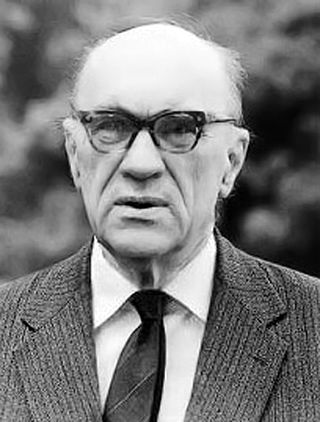
Jarosław Leon Iwaszkiewicz, was a Polish writer, poet, essayist, dramatist and translator. He is recognized for his literary achievements, beginning with poetry and prose written after World War I. After 1989, he was often presented as a political opportunist during his mature years lived in communist Poland, where he held high offices. He was nominated for the Nobel Prize in Literature four times. In 1988, he was recognized as a Righteous Among the Nations for his role in sheltering Jews during World War II.

Helena Modrzejewska, known professionally as Helena Modjeska, was a Polish actress who specialized in Shakespearean and tragic roles.

Tadeusz Łomnicki was a Polish actor, one of the most notable stage and film artists of his time in Poland. He is remembered mostly for his roles in comedies and dramas, as well as for the role of Kordian in Juliusz Słowacki's play of the same title. He was also a notable professor and a rector of the State Theatre School in Warsaw.
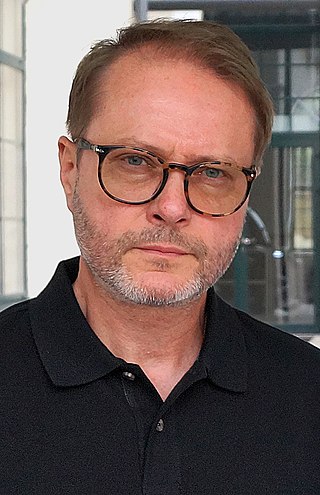
Artur Żmijewski is a Polish film and stage actor.
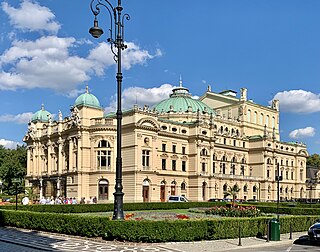
Juliusz Słowacki Theatre is a 19th-century Eclectic theatre-opera house in the heart of Kraków, Poland, and a UNESCO World Heritage Site. Erected in 1893, it was modeled after some of the best European Baroque and Eclectic theatres such as the Palais Garnier in Paris. The theatre was named after Polish poet Juliusz Słowacki in 1909 and in 1978 was inscribed alongside the Historic Centre of Kraków into the World Heritage Register.

Lidia Zamkow (1918–1982) was a Polish theatre actress and director.
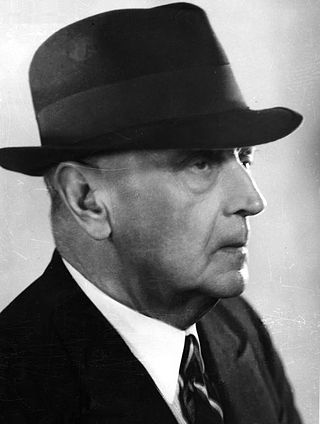
Karol Adwentowicz was a Polish actor and theater director. Adwentowicz fought in the Polish Legions in World War I, and upon the return of Poland's sovereignty, embarked on a hugely successful touring career across the country. During the Nazi occupation of Poland he was imprisoned in Pawiak. He died in Warsaw, two years after the Polish October.
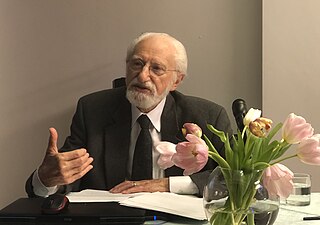
Kazimierz Braun is a Polish director, writer, and scholar.

The Ignacy Jan Paderewski Pomeranian Philharmonic has been at its present site in Bydgoszcz, Poland, since 16 November 1953. It bears the name of Polish pianist and composer Ignacy Jan Paderewski. The Pomeranian Philharmonic is the musical center of Kuyavian-Pomeranian Voivodeship and also features an outdoor art gallery. It is registered on the Kuyavian-Pomeranian Voivodeship Heritage List.
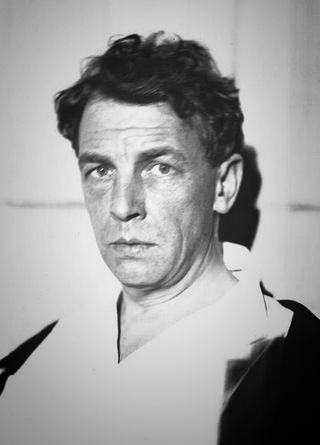
Juliusz Osterwa, born Julian Andrzej Maluszek, was a renowned Polish actor, theatre director and art theoretician active in the interwar period. He was the founder of Theatre Reduta, the first experimental stage in Warsaw following Poland's return to independence at the end of World War One. Osterwa began his Warsaw career at the age of 33 by staging the works of Poland's revolutionary dramatists including Juliusz Słowacki, Stanisław Wyspiański, Stefan Żeromski, Jerzy Szaniawski, Kazimierz Przerwa-Tetmajer, and Cyprian Norwid. This team was commonly known as the actor's commune, resembling an ascetic monastery devoted to spiritual practice.
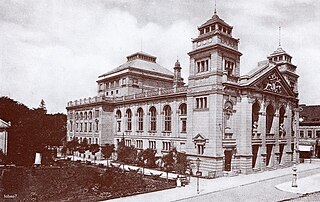
The Municipal Theatre of Bydgoszcz is a former theatre building which stood in Bydgoszcz, Poland from 1896 to 1946.
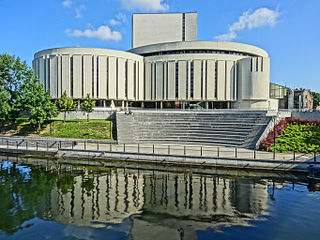
The Opera Nova is an opera house in Bydgoszcz, Poland. It was established in 1956, and it also plays the role of a musical theatre. It is one of the 10 opera houses in Poland and the only one of this size in the Kuyavian-Pomeranian Voivodeship. Opera Nova also welcomes the scene of the Bydgoszcz Buratino Puppet Theatre.
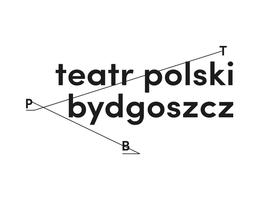
Polish Theatre in Bydgoszcz is a theatre in Bydgoszcz, Poland. It has been established in 1949, at 2 Adam Mickiewicz Alley, in downtown district. It is the outcome of a long and rich tradition of plays and performance in the city.
Bolesław Taborski was a Polish poet, literary and drama theoretician, essayist, prolific translator of English and Polish, and a long serving BBC Polish Section editor and presenter. He chronicled and translated into English the work of some of the most notable Poles of the Post-war era of the 20th century, such as Lech Wałęsa, Jan Kott, and Jerzy Grotowski. His undoubted influence on modern theatre has yet to be assessed in detail. He had a personal friendship with Pope John Paul II which grew out of their shared interest in literature and the fact that Taborski was his literary translator into English.

Marian Turwid-Kaczmarek, also known as Marian Turwid was a Polish writer, painter and cultural activist in Bydgoszcz, and member of the National Committee of the National Unity Front in 1958.

Adam Franciszek Józef Siedlecki or Adam Grzymała-Siedlecki (AGS) (1876–1967) was a Polish literary and theater critic, playwright, translator, prose writer and director.

Stanisław Horno-Popławski (1902-1997) was a Russian-Polish painter, sculptor and pedagogue.
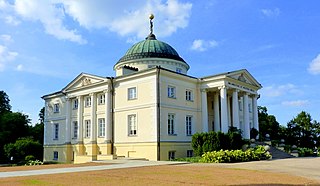
The Lubostroń Palace is a neoclassical palace, built in 1795-1800 by Stanisław Zawadzki, a leading architect of the time. Author, among others, of edifices in Warsaw and in the region of the Greater Poland, Zawadzki was commissioned by Count Fryderyk Skórzewski to realize the project on the location of the Piłatowo folwark. The complex has been registered on the Kuyavian-Pomeranian Voivodeship Heritage List.
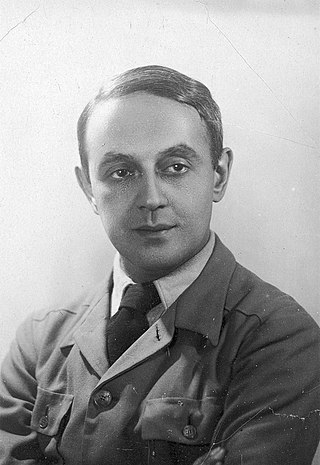
Witold Zdzitowiecki - Polish theatre director, actor and singer, best known as an operetta director.
Stanisław Szymański was Polish ballet dancer. In the years 1967–1985, he was the premier danseur of the Grand Theatre, Warsaw.



















